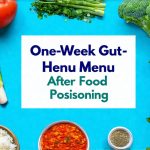Illness, whether a common cold, a bout of food poisoning, or something more serious, often takes a significant toll on our bodies. Beyond the immediate symptoms, there’s a subtle but crucial aspect that frequently gets overlooked: enzyme production. Enzymes are the workhorses of virtually every bodily function – from digestion and nutrient absorption to immune response and cellular repair. When we’re sick, our bodies divert resources towards fighting off the illness, often at the expense of these essential processes, including enzyme synthesis. This can lead to a temporary deficiency that exacerbates recovery, contributes to lingering symptoms like fatigue or digestive upset, and even impacts long-term health if not addressed. Understanding how to gently support your body’s natural enzyme production after an illness is therefore a powerful step towards regaining vitality and resilience.
The focus isn’t about replacing enzymes (though supplemental enzymes can sometimes be helpful – discussed briefly later), but rather creating the optimal conditions for your body to rebuild its own enzymatic capacity. This involves a holistic approach encompassing dietary choices, lifestyle adjustments, and mindful practices that prioritize rest and rejuvenation. It’s about acknowledging that illness disrupts metabolic balance, and providing the building blocks and environment needed to restore it. The good news is that supporting enzyme production isn’t complicated; it’s largely about returning to foundational health principles and offering your body a little extra care during its recovery phase.
Dietary Strategies for Enzyme Support
A cornerstone of post-illness recovery, and particularly crucial for enzyme production, lies in mindful nutrition. The foods we consume directly impact our ability to synthesize enzymes and provide the necessary raw materials for their creation. Prioritizing whole, unprocessed foods is paramount. These naturally contain enzyme precursors – amino acids, vitamins, and minerals – that your body uses to build its enzymatic workforce. Think of it like providing the construction crew with all the tools and materials they need to get the job done efficiently. Specifically, focusing on nutrient-dense options can accelerate recovery.
Foods rich in zinc (pumpkin seeds, spinach, beef) and vitamin B6 (poultry, fish, potatoes) are particularly important, as these nutrients play vital roles in enzyme synthesis and function. Similarly, adequate protein intake is essential since enzymes themselves are largely composed of amino acids. However, digestibility becomes key when recovering from illness. Highly processed foods or those difficult to digest can put additional strain on a compromised digestive system, hindering nutrient absorption and further depleting enzymatic reserves. Therefore, opting for easily digestible proteins like poached chicken, fish, or tofu is often preferable during the initial recovery stages.
Furthermore, incorporating enzyme-rich foods themselves can provide a temporary boost while your body rebuilds its own supply. Fermented foods such as yogurt (with live cultures), kefir, sauerkraut, kimchi, and miso are naturally teeming with enzymes that aid digestion and support gut health – often compromised during illness. Fruits like pineapple, papaya, mangoes, and kiwis contain bromelain, papain, and actinidin respectively, powerful proteolytic enzymes that assist in breaking down proteins. These aren’t meant to be a long-term solution but can provide valuable support while your body ramps up its natural production.
Optimizing Digestive Function
Enzyme production is inextricably linked to digestive health. A healthy gut microbiome – the community of bacteria residing in our intestines – plays a significant role in both enzyme synthesis and the efficient absorption of nutrients needed for that synthesis. Illness often disrupts this delicate balance, leading to dysbiosis (an imbalance of gut bacteria) and impaired digestion. Supporting your gut flora is therefore vital.
- Probiotic supplementation can be beneficial, but it’s important to choose a high-quality probiotic with diverse strains. Even better, focus on incorporating probiotic-rich fermented foods into your diet consistently.
- Fiber intake is also crucial for fostering a healthy microbiome. Soluble fiber (found in oats, apples, and beans) feeds the beneficial bacteria in your gut, promoting their growth and activity.
- Avoid foods that disrupt the gut microbiome, such as excessive sugar, processed foods, and artificial sweeteners.
Addressing digestive issues directly can significantly lighten the load on your system, allowing it to focus resources on enzyme production and overall recovery. Consider gentle digestive aids like ginger or peppermint tea if you’re experiencing bloating or discomfort. Hydration is also key; water helps move food through the digestive tract and supports optimal enzymatic function.
The Role of Antioxidants
Illness generates oxidative stress – an imbalance between free radicals and antioxidants in the body. Free radicals are unstable molecules that can damage cells, including those responsible for enzyme production. Therefore, bolstering your antioxidant intake is crucial for protecting these cellular processes and supporting overall recovery.
- Vitamin C, found abundantly in citrus fruits, berries, and peppers, is a potent antioxidant that also supports immune function.
- Vitamin E (nuts, seeds, avocado) protects cell membranes from damage caused by free radicals.
- Polyphenols, abundant in colorful fruits and vegetables like blueberries, kale, and green tea, have powerful antioxidant properties.
Consuming an antioxidant-rich diet helps neutralize free radicals, reducing cellular damage and promoting enzyme synthesis. Beyond dietary sources, consider incorporating practices that naturally boost your body’s own antioxidant defenses, such as regular moderate exercise (when you feel up to it) and stress management techniques like meditation or yoga.
Supporting Liver Detoxification
The liver plays a central role in detoxification – eliminating toxins from the body. During illness, and particularly when recovering from infections, the liver works overtime to process metabolic waste products and fight off pathogens. This can deplete essential nutrients needed for enzyme production and compromise its overall function. Supporting liver health is therefore an indirect but important way to enhance enzymatic capacity.
- Minimize exposure to toxins by choosing organic foods whenever possible, avoiding harsh chemicals in cleaning products and personal care items, and limiting alcohol consumption.
- Incorporate liver-supportive foods into your diet, such as beets, garlic, grapefruit, and leafy greens. These contain compounds that aid detoxification pathways.
- Stay well-hydrated to help the liver flush out toxins efficiently.
- Consider incorporating herbs traditionally used for liver support (under the guidance of a qualified healthcare professional) like milk thistle or dandelion root.
It’s important to remember that supporting enzyme production is not about quick fixes or aggressive interventions. It’s about creating a supportive internal environment that allows your body to naturally regain its balance and vitality. Prioritizing whole foods, optimizing digestive function, bolstering antioxidant defenses, and nurturing liver health are all integral components of this process. While supplemental enzymes can sometimes be used as a temporary bridge during the initial recovery phase – particularly if experiencing significant digestive discomfort – they should not replace the fundamental focus on dietary and lifestyle adjustments that promote long-term enzymatic resilience. Ultimately, the most effective approach is one that aligns with your body’s innate healing capabilities and empowers you to regain control of your health after illness.


















